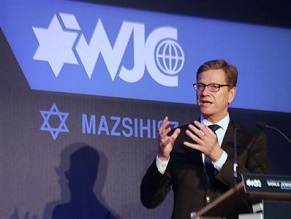|
World Jewish News

German Foreign Minister Guido Westerwelle addresses the Plenary Assembly of the World Jewish Congress in Budapest amid concerns over growing anti-Semitism in Hungary.
|
Guido Westerwelle: ‘Anti-Semitism has no place neither in Berlin, nor in Budapest, nor anywhere else in Europe or in the world’
07.05.2013, Anti-Semitism German Foreign Minister Guido Westerwelle declared that “anti-Semitism has no place neither in Berlin, nor in Budapest, nor anywhere else in Europe or in the world,” in an address to the World Jewish Congress’ (WJC) Plenary Assembly in Budapest.
“We are firmly committed to protecting and nourishing Jewish life in our societies and to countering anti-Semitism across the globe. We have to tackle the root causes of anti-Semitism,” the minister added.
“We have to educate about the Holocaust and promote research. This fight is about preserving our common values, about standing up for freedom, for human rights, for our dignity.”
Westerwelle’s remarks, for which he received a standing ovation from the 600 delegates and observers from Jewish communities and organizations across the world, come as anti-Semitism is on the rise in several European countries, particularly Hungary.
The WJC has decided to hold its Plenary Assembly in Budapest – and not in Jerusalem as it usually does - in light of concerns over growing anti-Semitism in the Central European country.
In a speech at the opening of the gathering on Sunday, Hungarian Prime Minister Viktor Orban said "anti-Semitism today in Hungary is unacceptable and we will show zero tolerance in regards to it", but he stopped short of censuring the extreme-right anti-Semitic Jobbik party.
“We don’t want Hungary to become a country of hate and anti-Semitism and we ask for your help and experience in helping us solve the problem. History taught us that we should act fast and strongly against anti-Semitism whenever it arises. We will do whatever it takes to stop it,” Orban declared.
On Saturday the Jobbik party – which is the third largest political formation in the country- held a protest against the Hungarian capital hosting the WJC meeting. The rally was billed as a tribute to what organisers called the victims of Bolshevism and Zionism.
"The Israeli conquerors, these investors, should look for another country in the world for themselves because Hungary is not for sale," the party’s chairman Gabor Vona told the crowd.
In recent years, anti-Semitic rhetoric and incidents have been on the rise in Hungary – home to the largest Jewish community in Central Europe.
Last November, a deputy of the Jobbik party caused outrage by proposing in parliament drawing up a list of people "of Jewish origin (who) present a national security risk to Hungary,” and last June, the Nobel Peace Prize laureate and Holocaust survivor Elie Wiesel returned Hungary's highest state honor, saying that the government had been "whitewashing" the country’s role in the deportation of Jews during World War II.
In recent years, the Jobbik party has been able to establish a strong presence in the Hungarian parliament, and support for the party continues to rise.
In his address, Westerwelle also stressed that the EU's legal options to curb violations of democratic norms were either as weak as toothpicks or as strong as bazookas.
"Between the toothpick and the big bazooka, there is not an instrument we can (use) if concerning developments start in a government or in a country," he said.
"Tolerance is wise," he said the four-yearly assembly, but "tolerance in the face of intolerance is historic foolishness".
Four European Union members, Denmark, Finland, Germany and Holland, have proposed the European Commission should be able to take action when fundamental rights are violated, without having to go through the complicated steps that now exist for such cases.
But the proposal, which Westerwelle said was supported by about three quarters of all EU Foreign Ministers, names no countries causing concern and puts forward no concrete plans.
The EU has threatened to take legal action to overturn recent constitutional changes that limit the powers of Hungary's top court. Hungarian Prime Minister Orban has also clashed with Brussels over legislation on the media and the central bank.
by: Yossi Lempkowicz
EJP
|
|
